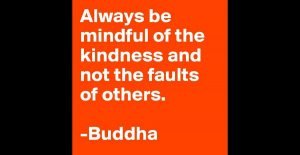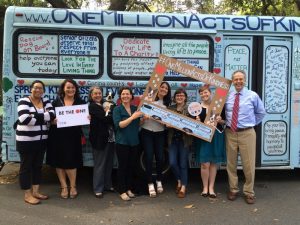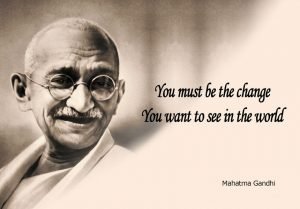By Lori Deschene
When I was a teenager, right around the time I knew everything, my mother used to tell me I only remembered the bad things.
When I told stories about my family, they didn’t revolve around family beach trips, barbecues, and vacations; they focused on painful memories and all the ways I felt my mother had “ruined my life.”
The same applied to friends and milestones in my life. I chronically remembered and rehashed the worst experiences.
In fact, straight through college I followed up every introductory handshake with a dramatic retelling of my life story, focusing on a laundry list of grievances about people who had done me wrong.
It was as if I was competing for most royally screwed over in life, like there was some kind of prize for being the most tragic and victimized. (Full disclosure: I hoped that prize was compassion and unconditional love. It was more like discomfort and avoidance).
Not everyone is as negative or needy as woe-is-me-younger Lori was, but I’ve noticed that many of us have something in common with my misguided past self: We focus on how we’ve been hurt far more than how we’ve been helped.
 Psychologists suggest that to some degree we complain because we’re looking to connect with people who can relate to the universal struggles we all face (though in some cases, complaining is a constructive way to find solutions to problems as opposed to a chronic need to vent negativity). I think there’s more to it, though.
Psychologists suggest that to some degree we complain because we’re looking to connect with people who can relate to the universal struggles we all face (though in some cases, complaining is a constructive way to find solutions to problems as opposed to a chronic need to vent negativity). I think there’s more to it, though.
When we complain about everything that’s gone wrong or everyone who has done us wrong, we’re drowning in our self-involvement.
It’s an epidemic in an individualistic culture where self-reliance, autonomy, and the pursuit of personal gain can leave us feeling isolated and pressured to succeed. This may not be true for everyone, but I know when I get caught up complaining, nine out of ten times what I need to do is stop obsessing about the circumstances of my life.
 It’s taken me a long time, but I’ve learned we don’t need to live life in a constant state of reaction to things that seem difficult or unfair. We don’t have to be the victims of bad coming at us. Our lives don’t have to be the sum of our problems—not if we take responsibility for putting good into the world.
It’s taken me a long time, but I’ve learned we don’t need to live life in a constant state of reaction to things that seem difficult or unfair. We don’t have to be the victims of bad coming at us. Our lives don’t have to be the sum of our problems—not if we take responsibility for putting good into the world.
That starts by fostering a greater appreciation for our interdependence. We are not alone. The world is not against us, and we don’t have to be against each other. We don’t have to let our fears, insecurities, and wants boil over inside us until we’re all a bunch of incompatible toxic chemicals waiting to explode the second we collide.
You can always find a negative story to tell—some situation when another person was insensitive, selfish, uncaring, unfair, or just plain wrong. You can also find an underlying struggle that doesn’t justify but might explain their behavior.
If you absolutely can’t channel that compassion and patience, you can always find at least one good thing someone did in your day.
When that stranger held the elevator open, when your coworker let you take the lead in your meeting, when your mother called just to say she loves you; they’re all reminders people are looking out for you—maybe not all of them, and maybe not all the time, but probably more than you notice.
 An even better way to honor our interconnection: be someone else’s positive story. Be the kindness that reminds someone else the world is not against them. Give them an anchor of positivity to find later if their circumstances seem overwhelming.
An even better way to honor our interconnection: be someone else’s positive story. Be the kindness that reminds someone else the world is not against them. Give them an anchor of positivity to find later if their circumstances seem overwhelming.
If you’ve ever ended a stressful day with a long hug—the type that’s so needed and loving it’s near impossible not to relax and receive—you know the power of a simple gesture.
Need some ideas for simple kindnesses? I recommend checking out the Tiny Buddha Facebook page, where I recently asked friends, “What’s the kindest thing you can do for someone else?”
Some of my favorite suggestions (out of 158) include:
- Try to accept people with an open mindand refrain from making judgments, which are often wrong anyway. (Brandon Hartford)
- Let them know how much you appreciate them. (Florence Leedy)
- Any deed done for someone else is a kind one when you don’t expect something in return.(Courtney Olsen)
- Do little things like hold doors openor let folk go in or out first. Little things can make a big difference for someone who’s not having a great day. (Elke Wallace)
- Accept them for who they areand who they strive to be. (Dylan Clauson)
- Let them know they’ve made you smile. (Monika Sylvestre)
- Be with them when they need you. For the rest of the time, let them be free. (Rohin Khanna)
- Tell them the truth.(Krista Hale)
- Tell them why they make a difference in your lifethat no one else could possibly make—why their particular brand of “special” makes the world a better place for everyone they meet in it. (Jennifer Hudson Green)
- Help them help themselvesand be independent. (Frantz Art Glass)
- Believe in themand give them hope. (Melessia Todd)
- Give a simple well meaning smile. (Jennie McCluskey)
- The kindest thing you can do for someone else is to take good care of your own mind, body and soul. This enables kindness in all things. (Shyloh Robinson)
- Spend time listening with the intent of learning.I joined an art guild that is mostly made up of elderly artists who have the most amazing life stories and the best tips and trick for creating artwork. I feel like I get so much more in return for doing nothing more than enjoying their company! (Suzi Ra)
- The best thing my parents ever taught me—the Golden Rule: do unto others as you would have them do unto you! (Tracy Bruce Laughlin)
- Be there for them when they falland not say I told you so. (Ana Stuckart)
- Give them the space to be.(Natassia Callista Alicia)
- Lend your shoulder to cry on.(Bryan Tankersley)
- Thank them for being themselves.(Jen Ghrist)
- Take a moment to send someone a note thanking them for something they have done for you in the past. For example, a good teacher or a good manager, or someone who was a mentor or role model. (Dave Hughes)
- Treat each person with respect for his or her individuality.(Shirley Wright)
- Offer encouragement after a failure. Acceptance of even the weirdest things they possess. A tap for a job well done. A “thank you” to every simple yet life-changing encounter. (Ako Ang Uso)
- Forgive. (Ivan Kl)
- Pay attention to them.From the clerk at the store to your kids at home, most people just want to be heard and acknowledged. Understanding comes later, but everyone can pay attention now. (Angela Birt)
- Listen to someone without trying to fix their problem. (Jane Lynahan Karklin)
What do you think? What’s the kindest thing you can do for someone else?
Photo by infomatique
About Lori Deschene
Lori Deschene is the founder of Tiny Buddha. She is the author of the Tiny Wisdom eBook series (which includes one free eBook) and Tiny Buddha’s Guide to Loving Yourself. She’s also the co-founder of the eCourseRecreate Your Life Story: Change the Script and Be the Hero. Follow @tinybuddha for inspiring posts and wisdom quotes.



